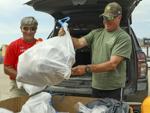
Will Clark, right, unloads his donation with Bus Culotta, a volunteer with the Greater Baton Rouge Food Bank, during Hunters for the Hungry's annual "Clean Out Your Freezer Day” collection at Bowie Outfitters in Baton Rouge, La., on Sunday, September 25, 2022.
What started out as a handful of hunters donating their excess bounty to food banks has morphed into an invaluable food source for Louisiana's underserved communities.
The organization, Hunters for the Hungry at 11019 Perkins Road, Baton Rouge, provides a way for Louisiana outdoorsmen to donate part or all of their game to meat processors, who then distribute it to food banks throughout the state.
Deer, fowl, fish — you name it. If it's in season, Hunters for the Hungry will take it.
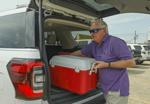
David Dewey takes a cooler filled with part of his donation out of his vehicle during Hunters for the Hungry's annual "Clean Out Your Freezer Day” collection at Bowie Outfitters in Baton Rouge, La., on Sunday, September 25, 2022.
This year, the organization has added feral hogs to its menu.
That got your attention, right? Well, it should, because there was a time when feral hog meat wasn't considered safe for eating.
That didn't stop hunters and farmers from culling the hog population to curb agriculture destruction. The result was a lot of dead hogs and wasted meat.
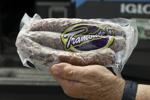
Bill Cobb holds out an example of the deer sausage that made up part of his donation to Hunters for the Hungry's annual "Clean Out Your Freezer Day” collection at Bowie Outfitters in Baton Rouge, La., on Sunday, September 25, 2022.
But that changed in 2022.
"For the longest time, they didn't want to take feral hogs because of diseases," said Laurie Fontenot, marketing director. "But we've found that feral hog meat is both good and safe, and obviously the processors know when it's safe, as well. As long as hunters are able to bring the meat to the processor, we can take the hogs in, and people are jumping on it."
A total of 625 hogs have been donated so far, accounting for approximately 23,000 pounds of meat.
"As for regulations, legislation was passed that specifically listed feral hogs as wild game and covered under the Louisiana Good Samaritan Law," Fontenot said.
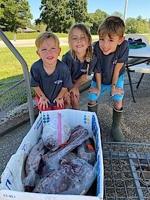
Brooks, Bailey and Hunter Links help donate food on Sunday at Feliciana Seafood.
Julie Grunewald, executive director of Hunters for the Hungry, added that the addition of hogs to the organization's Freshly Harvested Game program has been a major priority "due to the frustrations they give farmers, landowners and hunters.”
“We look forward to the impact this will have on our ability to provide more protein for the hungry, especially since we’re not bound to a season,” she said.
In fact, hog hunting has become so popular that Hunters for the Hungry and Dubach Deer Factory & Smokehouse in the north Louisiana town of Dubach are hosting their first hog tournament, Hogapalooza, during April and May with a $6,500 grand prize going to the team with the highest total weight of hog meat.
All meat must be donated to Hunters for the Hungry on the day of the kill during the tournament, which will then be processed and distributed to the Food Bank of Northeast Louisiana, the Food Bank of Northwest Louisiana, the Food Bank of Central Louisiana, the Greater Baton Rouge Food Bank and Second Harvest Food Bank of Greater New Orleans and Acadiana.
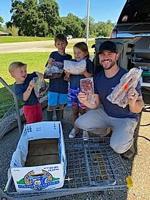
The Links family donates to the Hunters for the Hungry food drive on Sunday at Feliciana Seafood.
These are the places that distribute all the meat donated to Hunters for the Hungry, whose origins can be traced to 1994, when a group of local hunters gathered to discuss sharing the game and fish they harvested each year with the needy in the greater Baton Rouge area.
They organized Hunters for the Hungry and contacted the Society of St. Vincent de Paul, which served those first donations in its dining hall. After that, hunters' donations were so plentiful that St. Vincent de Paul ran out of storage.
Help was enlisted from the Greater Baton Rouge Food Bank.
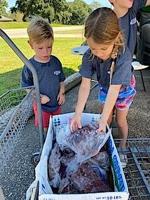
Brooks and Bailey LInks carefully take food out of their container to contribute to the Hunters for the Hungry on Sunday at Feliciana Seafood.
Since then, Hunters for The Hungry has partnered with the state's major food banks and has hosted such programs as the aforementioned Freshly Harvested Game and Fish and Clean Out Your Freezer Day to provide meals for thousands of Louisiana families.
There's also the Donate a Deer program.
“So many of our hunters want to fill their own freezers but then continue to partake in the remainder of the hunting season," Grunewald said. "This program is the perfect way to continue to hunt throughout the season but also give back to your community."
The state Department of Wildlife and Fisheries advises hunters and landowners, according to Grunewald, to monitor the number of deer that are on their property.
"Our program provides an avenue to keeping a healthy herd of deer on your property and donating what needs to be harvested," she said.
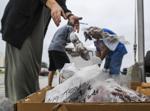
A frozen pack of Teal hearts sits in box after being donated during the annual Hunter’s for the Hungry food drive at Cajun Field on Sunday, September 20, 2020 in Lafayette, FL.. Hunters For The Hungry’s mission is to encourage hunters and fishermen to make a difference in the lives of their neighbors by sharing their bounty of wild game and fish in order to combat hunger.
Also, sportsmen who find themselves fishing in Venice can participate by donating a portion of their catch at Venice Marina. The marina will clean and process the fish for Hunters for the Hungry at no cost to the fishermen.
In 2022, Venice Marina processed over 5,000 pounds of fish for the organization.
While similar organizations can be found in some 32 other states, Louisiana's Hunters for the Hungry is autonomous. Funding is raised through business sponsors and individual donations made by visiting the organization's website at h4hla.org.
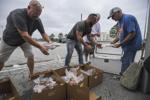
Andy West, from left to right, Eric Arnaud, Todd Belaire and Brian Potier, sort out the wild game that was donated during the annual HunterÕs for the Hungry food drive at Cajun Field on Sunday, September 20, 2020 in Lafayette, FL.. Hunters For The HungryÕs mission is to encourage hunters and fishermen to make a difference in the lives of their neighbors by sharing their bounty of wild game and fish in order to combat hunger.
"The other initiative we have to help us with those donations is through licenses and tags," Fontenot said. "If anyone buys a hunting or fishing license or a tag, like a deer or duck tag at the Department of Wildlife and Fisheries website, you can click on the Hunters for the Hungry icon at the end and choose to donate there."
For hunters participating for the first time, Fontenot advises that Hunters for the Hungry has central drop-off location.
"Everything needs to be dropped off at one of our processors," she said. "We work with close to 30 processors throughout the state, and whenever we raise and collect funds, those funds are mainly used to cover the cost of the processing."
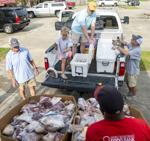
From left, Hunters for the Hungry board president Chip Songy watches as Lucy Grunewald, daughter of the Hunters for the Hungry Executive Director Julie Grunwald helps load donated food collected by the group on clean out your freezer day to a Baton Rouge Food bank truck. Lucy's dad Hamp and her Grandfather Hampton as well as Fred Thomas with the Food Bank are also in the picture.
A list of the processors, along with their phone numbers and the cities and parishes in which they're located can be found on the Hunters for the Hungry website. Also, there are checks beside those that accept feral hogs.
For more information, visit h4hla.org.
"fish" - Google News
April 23, 2023 at 07:30PM
https://ift.tt/6OFYThG
Feral hogs? Hogapalooza to the rescue. Fresh game and fish help feed Louisiana's hungry - NOLA.com
"fish" - Google News
https://ift.tt/s9MhaOD
https://ift.tt/vMEjhyk
Bagikan Berita Ini














0 Response to "Feral hogs? Hogapalooza to the rescue. Fresh game and fish help feed Louisiana's hungry - NOLA.com"
Post a Comment